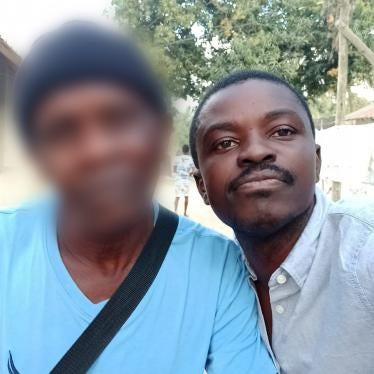Aisha has fled violence twice since her house was reduced to ashes during a massive attack in 2018 on her village in Macomia, northern Mozambique, by an armed group locally called Al Shabab or Mashababos. She sought refuge in another town, where two years later an alleged Al Shabab fighter beheaded her 14-year-old son in front of her, prompting her to flee by boat to the provincial capital, Pemba. Aisha, whose full name I am not using for her protection, knows her son’s killer, and she says she will identify him for the authorities if they assure her that justice will be done.
Over the past five years, since Al Shabab fighters linked to the IS began their insurgency in Cabo Delgado, northern Mozambique, civilians have suffered horrendous human rights abuses at the hands of both government forces and Al Shabab fighters. Forces on both sides have been implicated in war crimes, including killing civilians, sexual violence, and destroying property.
Despite the massive human rights abuses, the intervention of African regional bodies such as the SADC and the African Union (AU) in Mozambique have mostly focused on military operations against the insurgents while largely ignoring redress for victims of abuses. Last year, SADC and Rwanda sent thousands of troops to bolster the Mozambican forces. Recently, the AU Peace and Security Council called for more military equipment to be speedily shipped to Mozambique.
According to ACLED data, over 4,000 people have been killed since the start of northern Mozambique’s conflict in October 2017. Almost a million people are displaced, some in camps and informal settlements with limited access to basic necessities.
Women and children have experienced exceptional harm. Al Shabab fighters have abducted, enslaved, raped, forced into marriage, and sold to foreigners hundreds of women and girls. The group has also beheaded young men, and kidnapped and used boys to fight government forces, in violation of the international prohibition on recruiting and using child soldiers. They have also destroyed civilian structures, including houses, hospitals, schools, and places of worship.
Mozambican government forces have also been implicated in serious human rights abuses, including extrajudicial killings, arbitrary detention, sexual harassment, and ill-treatment of detainees, in violation of international human rights and humanitarian law. Most of the victims were suspected of having links to Al Shabab. But a mass trial in 2019 showed the extent of arbitrary detentions. The judge acquitted 113 of the 189 defendants for lack of evidence. One of them was a woman arrested and detained with her eight-month-old baby for giving water to a suspected insurgent.
Security forces also have prevented people from fleeing the fighting, violating laws-of-war requirements that warring parties protect civilians and remove them from the vicinity of military operations.
Not even journalists were spared, with many experiencing enforced disappearance, intimidation, detention, and prosecution over the years.
The Mozambican government has ignored rights groups’ calls to investigate and appropriately punish security forces implicated in abuses. In 2021, the African Commission on Human and Peoples’ Rights (ACHPR) issued a resolution calling on the government to ensure greater protection of civilians. But no one has been held to account for the abuses documented and exposed by Human Rights Watch (HRW) and other groups. The government’s legal actions against suspected Al Shabab fighters have also fallen short of victims’ expectations, as only a few cases have been tried successfully in court.
President Filipe Nyusi has been criticized for bypassing state institutions and violating the constitution when he unilaterally moved to pardon alleged insurgents who responded to authorities’ appeals for surrender. He rebuked those criticisms, claiming that he was only publicly presenting rescued civilians who would be reintegrated into their communities.
The AU Transitional Justice Policy, approved in 2019, stipulates that “pardons, in contrast to amnesties, are conferred after a prosecutorial process has been followed to its conclusion.” It further notes that even amnesties “should be formulated with the participation and consent of affected communities, including victim groups, and have regard to the necessity of the right of victims to remedy, particularly in the form of getting the truth and reparations.”
Under the Protocol to the African Charter on Human and Peoples’ Rights on the Rights of Women in Africa (the Maputo Protocol), the Mozambican government has obligations to prevent gender-based violence, investigate, prosecute, and punish those responsible for abuses, and provide timely, accessible, and effective remedies to victims and survivors. But the government has done little or none of that.
In fact, the government has revictimized some women and girls, keeping them incommunicado for weeks or longer after rescuing them, without access to their relatives. On at least one occasion, HRW sources witnessed some of these women being paraded in public as suspected informants or aides for the insurgents.
SADC and the AU should not continue to sideline human rights protections in their military operations against Al Shabab. These regional bodies should immediately take concrete steps to support efforts for accountability and justice for the victims of the northern Mozambique conflict. This starts with publicly urging the Mozambican authorities to investigate all allegations of abuses by both state security forces and Al Shabab and prosecute those implicated in fair trials.
Mozambican authorities should ensure that the route to peace and stability in the northern part of the country also includes accountability and reparations for victims. The government, in collaboration with the AU, should also mandate the ACHPR to set up an independent commission of inquiry to investigate the widespread rights violations.
Aisha deserves a real chance to seek justice against the man who killed her son, and so do millions of other Mozambicans who have suffered for so long.








